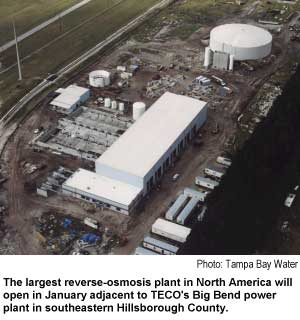
|
Our subscribe page has moved! Please visit baysoundings.com/subscribe to submit your subscription request. |
 |
|
Tampa Bay Ethical Angler Wallet Card
The "Tampa Bay Ethical Angler Wallet Card" shows illustrations of 12 of the fish species most commonly caught in the bay - including Spanish mackerel, sea trout, snook and sheepshead - with information about bag limits, seasonal closures and other harvest restrictions for each species. The Florida Fish and Wildlife Conservation Commission assisted in the development of the card. The card is printed on a durable latex paper and folds up to the size of a credit card so it can be carried with anglers on the water. The folded card easily fits in a wallet, shirt pocket or tackle box. In addition to fishing regulations, the wallet card offers tips for ethical angling, and phone numbers to report fisheries violations, fish kills, or fish tags. "Fishing is one of the most popular recreational activities in the bay and it has really improved as water quality has gotten better and wetlands have been restored," said Nanette Holland, public outreach coordinator for the estuary program. "But with more and more anglers sharing space on the bay, we all need to be sure we're practicing good conservation techniques, so the great fishing will continue." To get your Ethical Angling Wallet Card, call (727) 893-2765 or e-mail nanette@tbep.org. El Ni–o Forces Increased Discharges At Piney Point The Florida Department of Environmental Protection is expected to issue an emergency order in mid-January that allows for the release of water carrying about 75 tons of nitrogen over a 90-day period from Piney Point, the abandoned fertilizer plant near Port Manatee. That compares with about 16 tons of nitrogen released in the fall of 2001 after Tropical Storm Gabrielle. Over the longer term, the construction of a pipeline that would take water from the phosphogypsum stacks further into Tampa Bay was recommended by a group of Agency for Bay Management members. Piping water out of Bishop Harbor - one of the region's most pristine aquatic preserves - would minimize environmental impacts and allow for increased flushing. The emergency order is expected to allow the discharge of approximately two million gallons per day treated with a "double lime plus aeration" process that normalizes acidity and reduces nitrogen levels to about 100 mg/l. Scientists are hopeful that the discharges will have a minimal impact because of cold water temperatures during winter months. DEP had begun to close the plant in 2002, after having met water management goals for most of the year. Those activities have been postponed until the end of this year's rainy season. "Heroic efforts" to continue with the closure included an emergency order issued on Dec. 26 that allowed for the discharge of water carrying up to 85 pounds of nitrogen per day. Still, storms on New Year's Eve pushed the plant's capacity so low that managers estimate it would hold runoff from only about two or three inches of rain at normal levels and less than eight inches in an emergency situation. Exceeding capacity could potentially cause the system to fail, releasing millions of gallons of highly acidic water carrying heavy metals as well as nutrients. "That would have much more impact than just the high levels of nutrients," said Phil Coram, program administrator of the DEP's Bureau of Land Reclamation. To prevent future problems, DEP is recommending approval of new regulations that require more stringent financial assurances from phosphate companies. Additionally, other plants located in the region have been inspected to ensure that they are managing water appropriately during periods of high rains. New Desal Plant Sets Records
ð It's the largest reverse-osmosis plant in North America, producing 25 million gallons of ultra-pure water every day. ð It's the least-expensive desalinated water in the world, with an average cost of just $2.49 per thousand gallons over the next 30 years. Subsidies from the Southwest Florida Water Management District further lower the cost to about $1.88. ð Some of the nation's most stringent environmental safeguards are planned, including intensified monitoring initiatives by both Tampa Bay Water and Hillsborough County Environmental Protection Commission. The concern is that salty brine left over from the RO process will raise salinity levels in Tampa Bay. Most researchers believe the potential for damage is slight, because the 19 million gallons of concentrated seawater will be diluted with 1.4 billion gallons of cooling water from the power plant. Additional safeguards include an early warning system that continually monitors discharge for salinity, and a second alarm that automatically shuts down affected areas of the plant if salinity levels reach the plant's permitted maximum. The $110 million, 30,000-square-foot plant also takes advantage of advancements in membrane technology, innovative energy recovery technology, and co-location with TECO's Big Bend power plant to minimize environmental impacts. Located on an 8.5 acre site in Apollo Beach, the desalination plant is part of a multipronged effort to reduce the region's dependence on groundwater. Another 25 mgd desal plant is planned for construction adjacent to Florida Power's plant on the Anclote River in north Pinellas County. |
 A new wallet card created by the Tampa Bay Estuary Program is designed to encourage responsible angling in the bay. The card is available free upon request, and also will be distributed through many bait and tackle shops in the area.
A new wallet card created by the Tampa Bay Estuary Program is designed to encourage responsible angling in the bay. The card is available free upon request, and also will be distributed through many bait and tackle shops in the area. Assuming all goes as planned, Tampa Bay Water will set a series of new records when the region's first seawater desalination plant comes online in January near TECO's Big Bend power plant:
Assuming all goes as planned, Tampa Bay Water will set a series of new records when the region's first seawater desalination plant comes online in January near TECO's Big Bend power plant: